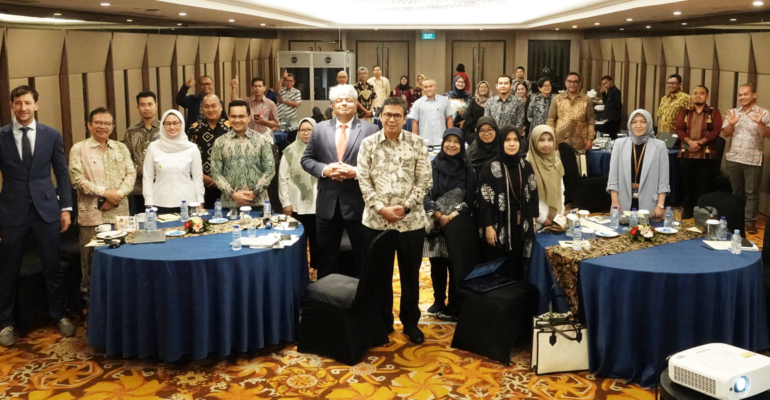IPB University Together with UNEP and Bappenas RI Holds High Level Meeting TEEBAgrifood Indonesia

IPB University together with The United Nations Environment Program (UNEP) and the Indonesian National Development Planning Agency (Bappenas) held the TEEBAgrifood Indonesia High-Level Meeting.
Collaboration between IPB University, Bappenas, and UNEP on The Economics of Ecosystem and Biodiversity for Agriculture and Food Initiative in Indonesia (TEEBAgriFood) activities is currently entering the final stage after running the program for two years.
This activity aims to present the results of studies from TEEBAgriFood Indonesia to stakeholders, especially regarding agroforestry in cocoa and coffee commodities. The meeting was also to obtain views and follow-up efforts on policy recommendations that have been formulated to support the progress and sustainability of cocoa and coffee commodities in Indonesia.
UNEP has issued a very comprehensive analytical framework, namely the TEEBA framework, a framework used to analyze the complexity of problems related to food and agriculture. This complex framework has special connections to several aspects, such as natural capital, produced capital, human capital, and social capital.
“To translate the TEEBA framework in understanding the complexity of the food and agricultural system, the team created a flow/scheme using a causal loop diagram and systems thinking approach, namely by looking at the aspects of biodiversity, production, socio-economics, value chains, interventions that can be carried out in the long term. “short, medium and long so that these two commodities remain a mainstay as well as making a very important contribution to ecosystem services,” said Prof R Nunung Nuryartono, chairman researcher of TEEBAgriFood Indonesia.
Also attending the forum, TEEB Coordinator and Head of UNEP’s Ecosystem Services Economics Unit, Dr Salman Hussain. He revealed that the TEEB study carried out in Indonesia was the most powerful study that UNEP had ever carried out. There are at least six or seven different models that have been done.
“Based on the TEEB framework, Indonesia is an extraordinary example for addressing existing food and agricultural system problems. At the UN food system summit, there was a coalition of agriculture and food values. “We want to inform the global community about the implementation and role of UNEP in the sustainability of the TEEB program,” he said.
North Luwu Regency, South Sulawesi was selected as a study location for cocoa.
According to the Regent of North Luwu, Hj Indah Putri, the results of the cocoa study are very meaningful, especially for continuing to encourage agroforestry cocoa. This aligns with Regional Regulation Number 8 of 2015 concerning Sustainable Agricultural Land Protection.
“We hope that this study can be immediately transferred to the regional government to become material in the implementation stages of the sustainable cocoa roadmap in North Luwu Regency,” said Hj Indah Putri Indriani, SIP, MSi, Regent of North Luwu.
Meanwhile, the study locations for coffee commodities are Tanggamus Regency, Lampung, and Bandung Regency, West Java. Deputy Regent of Bandung, Sahrul Gunawan said that implementing the TEEB study in Bandung could encourage an increase in coffee productivity there.
“However, it cannot be denied that there will definitely be challenges and opportunities in the future, such as demands for quantity and quality in coffee production which should be the basis for developing sustainable coffee,” he said. (*/Rz) (IAAS/Res)



